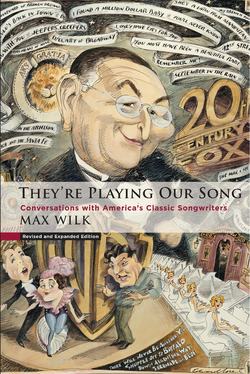Читать книгу They're Playing Our Song - Max Wilk - Страница 10
На сайте Литреса книга снята с продажи.
Preface · 1986 Edition ·
ОглавлениеIt’s fifteen years since this book was first published, and far too many of the talented people it celebrates have left us. But not their work. American musical comedy, the popular song, our jazz and our blues—they’re all an origination of a purely American culture.
I must confess I feel sorry for the songwriters who are working today. Not that there aren’t a lot of wonderful new talents around, but they’re going to have it a whole lot tougher than my contemporaries. At one time, the songwriter had control of the ballgame, so to speak. When he wrote a song, he took it to his publisher; then that worthy took it and bet his own money on it. He published the song, put it out in front of the people, and worked to get it on records, or pushed to have it performed by leading stars in cabarets, or on vaudeville, or on radio and TV.
That, alas, is a gone era. Nowadays, the publisher doesn’t control anything. Everything is in the hands of the performing and recording artists. Most artists have their own publishing companies, and their own crew of writers—that is, whenever they don’t write their own songs. As for the publisher (those few who are left), chances are he’s owned by a conglomerate, and when you’re controlled by such a massive structure, it’s what that organization wants done which counts. And conglomerates know only one thing—they want big name stars, with big name hits … all the way.
None of the stars of my day, the Doris Days, the Sinatras and the Streisands, started as big names. When they began, they were unknown. But individuals—not conglomerates—recognized their talents, and nurtured them into stardom. The same went for us songwriters; publishers nurtured us, too. Today, there’s nobody around to discover talent and nurse it along, and to take chances with it. It’s a conglomerate world.
There are many books—too many—written about show biz, theatre, movies, and performers. But most of them are written by well-meaning people who are on the outside, forever looking in. Since they really don’t know, they make a lot of it up. Too much of it.
Max Wilk’s book has to do with the opinions, ideas, and the philosophies of most of America’s greatest songwriters. Read it because it’s authentic. He didn’t make it up. He sat with us all and listened, and asked us the right questions. He knew which ones to ask because he’s been around the business all his life. He was, so to speak, to the manner born; he’s written and produced, and he’s been there with us. When you find it all laid out by him on the printed pages, know that it was not done by a Johnny-come-lately outsider assembling old newspaper clippings. Max knows us, warts and all, and when you’ve read the book, you’ll know us too. If you missed reading They’re Playing Our Song in its first (long out-of-print) edition, I urge you to grab the book. If you want to be a song-writer—and it always seems everyone who can strum or hum does, you owe it to yourself to learn how the successful ones of my era accomplished it.
If you ask me about the future, I have to be bullish about the work of all my songwriting friends of what I am certain has to be called a golden age. Fifty years from now, you’ll still be hearing Kern and Rodgers, Berlin and Sondheim, and Cole Porter. Believe me, I’ve seen proof of the stamina and longevity of my own work. Just in the past couple of years, I’ve had two big hits, Linda Ronstadt doing “Guess I’ll Hang My Tears Out To Dry,” and Barry Manilow with “I’ve Heard That Song Before”—both forty-year-old songs!
And it’s heartwarming to know that right now, here in 1986, when we’ve come through rock-and-roll, and punk rock, and hard rock, and bubble-gum music, and whatever other noise you hear being toted down the street by kids with boom-boxes, or by cowboys with their car-stereos playing full blast in traffic, I could go last night to the Kool Jazz Festival and hear my own “Time After Time” being played by great jazz musicians for umpteen lovely choruses!
Tomorrow night they’ll be playing Gershwin, or Lerner & Loewe, or songs by Arthur Schwartz, perhaps Harold Arlen, Burke and Van Heusen, always more Berlin, and professor, could you give us some Robin and Rainger, or Warren and Dubin, Gordon and Revel, or Johnny Mercer, or Kalmar and Ruby, or even more.
JULE STYNE
June 1986
